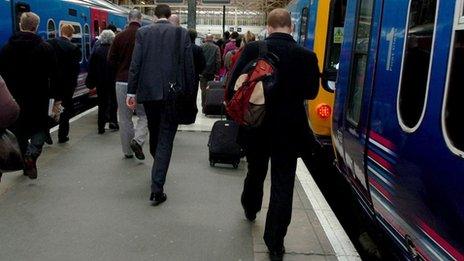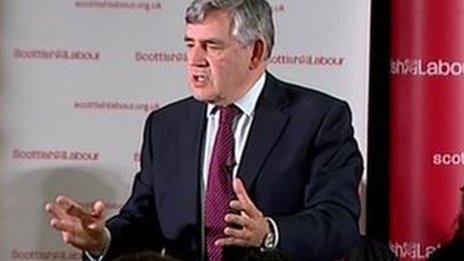Unions and Labour politicians urge ScotRail franchise delay
- Published

FirstGroup currently holds the Scotrail franchise
Unions and politicians have called for the suspension of ScotRail franchising process in the hope that new powers could allow it to be brought back into public ownership.
The winner of the franchise to operate trains in Scotland for the next 10 years should be announced this month.
Rail union leaders and a number of Labour MPs and MSPs said the process should be halted.
They said new powers could see responsibility for rail devolved.
That would allow the Scottish government to decide whether it wished to diverge from UK government policy and run the ScotRail service in the public sector.
A new deal on powers for Scotland was promised by the three main Westminster parties as part of the campaign which resulted in a "No" vote in last month's independence referendum.
Devolution settlement
Former Labour prime minister Gordon Brown, the driving force behind the "vow", included the option of a non-profit making railway company in his proposals for devolving powers to Scotland.
These plans have not been endorsed by the other parties but could form part of the negotiations which will be conducted by Lord Smith over the next few months.
Transport giant FirstGroup currently holds the ScotRail franchise, which is due to expire on 31 March 2015.
ScotRail operates more than 2,300 train services a day, delivering more than 86 million passenger journeys and 1.76 billion passenger miles a year.
The franchise employs a total of 4,900 staff.
The statement, signed by the general secretaries of the RMT, TSSA and ASLEF unions,, external said: "We welcome that as part of the new devolution settlement for the Scottish people there are commitments to devolved responsibility on rail so the Scottish government can decide whether it wishes to run Scotrail services in the public sector.
"In the words of Gordon Brown contained in his post-referendum speech 'enforced rail privatisation will be no more'."
The union leaders said they were concerned that if the franchise was awarded before the new powers were agreed then it would be another decade before rail could be nationalised.
Mark Griffin, Labour's Scottish transport spokesman, said the Scottish government's White Paper had claimed that an independent Scotland would be free to pursue "alternative approaches", including public-supported and not-for-profit models.
In a letter to Scotland's Transport Minister Keith Brown, he said: "It's clearly nonsensical for this tendering process to continue. With powers on the way which will allow us to fundamentally change the nature of railway service delivery in Scotland Keith Brown should halt this process now."
A Scottish government spokesperson said: "The Scottish government is obliged, under Westminster legislation, to operate a procurement competition for franchising of our railways, and we want to secure a good outcome for both passengers and the workforce.
"The ScotRail franchise is the single biggest contract let by the Scottish government and to suspend the procurement at this very late stage would, as was evidenced by the Department for Transport's West Coast Mainline fiasco, result in massive and unnecessary costs to the public purse."
- Published8 September 2014

- Published1 November 2013
